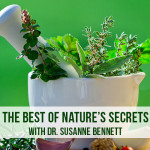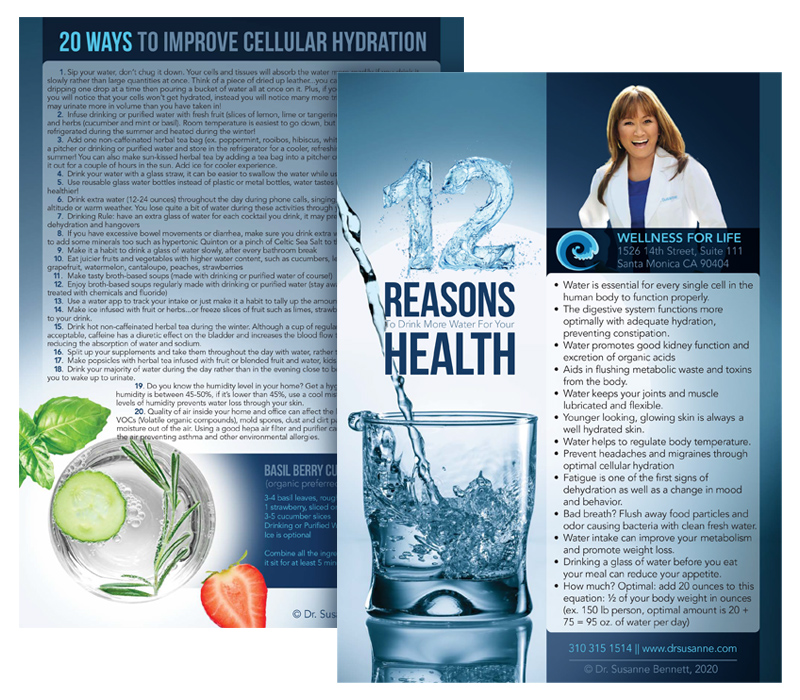Nature’s Secrets with Dr. Susanne Bennett
On this Episode: Mold Toxicity
Mold Toxicity in Your Home – What You Need to Know!
Dr. Susanne Bennett
When my son Cody was 2 years old, he had severe mold allergies, so terribly that We had to carry an Epipen, a medical injectable device just in case he had an anaphylactic reaction from eating anything contaminated with mold. Back them, 18 years ago, I didn’t and his pediatrician didn’t know much about molds and fungi and how toxic it can be to the human body.
Today, on Nature’s Secrets, we are going to discuss the Fungus Among us, whether it’s inside our body or outside, and how we can rid of it Naturally.
Molds are one type of fungus, and is different from plants, animals and bacteria.
Molds are eukaryotic micro-organisms that are decomposers of dead organic material such as leaves, wood, plants and even organisms.
The spores and threadlike appendages of individual mold colonies are too small for us to see without a microscope and can invade the food we eat and our living environment.
For people with general molds sensitivities, it can trigger irritating immune responses such as hay fever symptoms, allergic rhinitis and coughing issues.
For people with severe allergy symptoms or compromised immune systems, mold can cause chronic inflammation and more significant issues such as asthma, anaphylactic reactions, bronchial fungal infections, chronic fatigue and even irritable bowel syndrome.
Some ingested molds of aspergillus and fusarium species can be dangerous especially due to the potentially toxic substances it produces called mycotoxins.
Mycotoxins are the byproduct of mold growth, some molds excrete it to help fight off other molds and organisms…. It want to be the King of the hill , be the top dog in the neighborhood!
If eaten, it can cause severe GI and liver symptoms Mycotoxins damaging the intestinal lining causing leaky gut…. It can wipe out the liver function enough to cause liver failure… Long term exposure to mycotoxins such as aflotoxin can cause liver cancer….
Mycotoxins are also poisonous neurotoxins meaning they can be damaging to your central nervous system…and are found primarily in molds that grow on nuts especially peanuts and grain crops such as corn, rice and wheat.
They have also been found on celery, potatoes, apples, peppers, and other produce. It has been estimated that 25% of the world’s crops could be affected by mycotoxins, in particular a type called aflatoxin. Aflatoxins grow on peanuts and grains, particularly corn.
Given that corn and grains are used in their raw state in a lot of farm animal feed there is obvious concern about this toxin, in terms of its potential effect on humans. Aflotoxin has been found in cow’s milk due to contaminated feed, so we can get it indirectly by eating contaminated dairy products.
I think this is another great reason for staying away from dairy products!
Foods
- There are a lot of mold in the foods we eat… For instance, you know that blue stuff in the “blue cheese or roqhfort cheese” ? That is pennicilium roqforte mold you are eating! The outer covering on a big salami roll is infested with mold too!
1st. Other Foods risky for molds: Many cheeses, mushrooms, dried fruits, restaurant greens and salads, freshly squeezed fruit and veggie juices, packaged foods such as crackers and chips harbor mold and nuts such as peanuts, cashews and pistacios are susceptible to mold.
Every week, I have around 3-5 patients coming in because of stomach pain, diarrhea and vomiting due to food poisoning from eating at their favorite local restaurant… and more often then not, I find that it is due to them eating raw salads… the restaurants never washes the greens! They just grab the fresh greens out of the big plastic bag and pour on the dressing!
I suggest eating cooked veggies out, you can ask your waiter to have them make you a dish of saute’d arugula instead of it being in salad form… If you are jonesing for some fresh greens… in one minute, I’m going to teach you how to clean them at home so you can eat them mold free!
Again stay away from dairy products, they are notorious for growing mold on them!
2nd let’s implement “safe shopping” practices such as:
- Always read the “Best by” dates before adding I into your sopping cart!
- Don’t sniff something you suspect of being moldy! If you do, the mold spores are now up your nose! When in doubt, throw the item out.
- Store things at recommended temperatures.
- Don’t overbuy produce! Buy only a few days’ worth at a time as mold can start to grow after just a few days,, unless you Rinse your produce with Vitamin C!
- For all of the fresh greens, fruits you can’t peel such as berries and grapes, great for grains, nuts, seeds… I Use Vitamin C crystals to soak and wash any vegetable, fruit or grain. Just 15 minutes, works better than any veggie wash product I’ve ever seen; it cuts through bacteria and mold and as a super antioxidant it neutralized the pesticides and any fertilizers used on the produce. Remember, even organic produce can have pesticides on it because of “drift” between farms.
Make sure you get Ascorbic Acid, not the buffered kind or ester C, and get one that is Corn – Free… a lot of Vitmain C is made from GMO Corn, If you have trouble finding it you can go to https://drsusanne.com/crystals….
Finally If you find even one spot of mold on something, throw it out. Mold often has threadlike filaments that penetrate the item. So just spooning out the spot you see at the top may not get all of the contamination. Also, if one berry in a basket has mold, consider the whole basket contaminated and toss it.






What can you do to help a child when autism and ADHD problem.
Sorry Marianna, I didn’t catch this comment until today! Yes, I work with autism and ADHD issues. Much of it has to do with the absorption, utilization and production of nutrients, antioxidants, neurotransmitters as well as detoxification pathways. I also analyze individual methylation pathways and genetic variants to customize the patients restoration program. If you are interested in a consult, please call Frank at 310-315-1514. Best, Dr. Susanne